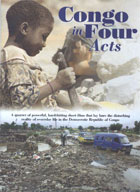
Congo in Four Acts 2009
Distributed by Icarus Films, 32 Court St., 21st Floor, Brooklyn, NY 11201; 800-876-1710
Produced by Djo Tunda and Steven Markovitz
Directed by Dieudo Hamadi, Divita Wa Lusala, and Kiripi Katembo Siku
DVD, color, 70 min., French with English subtitles
Sr. High – Adult
African studies, Area studies, Domestic Violence, Economics, Education, Environmental Studies, Human Rights, Law, Postcolonialism
Date Entered: 01/07/2011
Reviewed by Jason R. Harshman, The Ohio State UniversityTold in four vignettes that average eighteen minutes in length each, Congo in Four Acts offers a street-level view of what life for many in the Democratic Republic of Congo is like. Poverty, violence, and issues of power and gender permeate the lives of the residents of Kinshasa, the country’s capital city that one local priest describes as equivalent to “living in a village” because like a village, no services are available. Whether viewed collectively or individually, one gets a sense from each ‘act’ that while a structure of law exists in Kinshasa and the surrounding rural areas, justice is subjective and negotiable.
Set in a dilapidated maternity ward, patients become detainees of the Kitambo Maternity when they are unable to pay their hospital bill in directors Dieudo Hamadi and Divita Wa Lusala’s Ladies in Waiting. The new mothers are asked to offer collateral if they are able to pay the their total bill—in one instance only a four dollar difference remains—or they must remain in hospital with each passing day costing them more money. One father, unable to raise the money to pay for his wife’s delivery, offers his own freedom to the hardened hospital manager in return for his wife’s release, but is unsuccessful. By the conclusion it is difficult to decipher if the hospital administrators and staff are unsympathetic because they are callous profiteers or responsible bureaucrats protecting against fraudulent claims of being unable to pay.
In the capital city of Kinshasa, live electrical wires run across the ground, snaking between piles of garbage, make shift housing, street vendors, and standing pools of malaria-breeding water. Home to nearly 10 million people, an extended rain storm floods the portion of the city that Kiripi Katembo Siku’s Symphony Kinshasa focuses on, with residents wading through knee-high, garbage filled water for weeks afterward. Although not depicted, the capital city is also home to major universities, industry, and national government offices; however, these institutions are a world away from the hardships of the slums and the residents of the city vocalize their disappointment with the elected leaders who have failed to deliver on their campaign promises to better the lives of fellow Kinshasians.
Dieudo Hamadi’s Zero Tolerance centers on a rural community in which the perpetration of violence against women has become a way for ordinary men to exert their power. The main story line for this “act” follows two teenagers who, after a night of drinking, claim they assisted a woman who had passed out drunk in the street to her home while she claims the two boys raped her. Zero Tolerance presents the harsh reality faced by local authorities as they try to uphold the morality of a small town that represents a microcosm of a nation in which rape is used as a weapon.
The fourth story, After the Mine, directed by Kiripi Katembo Siku, is set in the small town of Kipushi, which is situated between a rock quarry and an artificial desert. The story centers on a young girl who was orphaned after the death of her parents and taken in by her grandmother. The seven year-old girl breaks rocks all day and her grandmother, after working in the fields, transports the small laundry-basket size container of gravel to a wholesaler in return for a quarter which is then used to buy two bowls of flour to eat.
Throughout Congo in Four Acts, the issue of power—who has it and how does one exert their power over another human being—is the social, political, and economic framework all citizens, regardless of gender, age, or class, must contend with on a daily basis. This documentary presents a raw view of how national issues of war and government corruption trickle down and create citizens who replicate that violence and create a society in which dignity and respect are relegated secondary to survival.